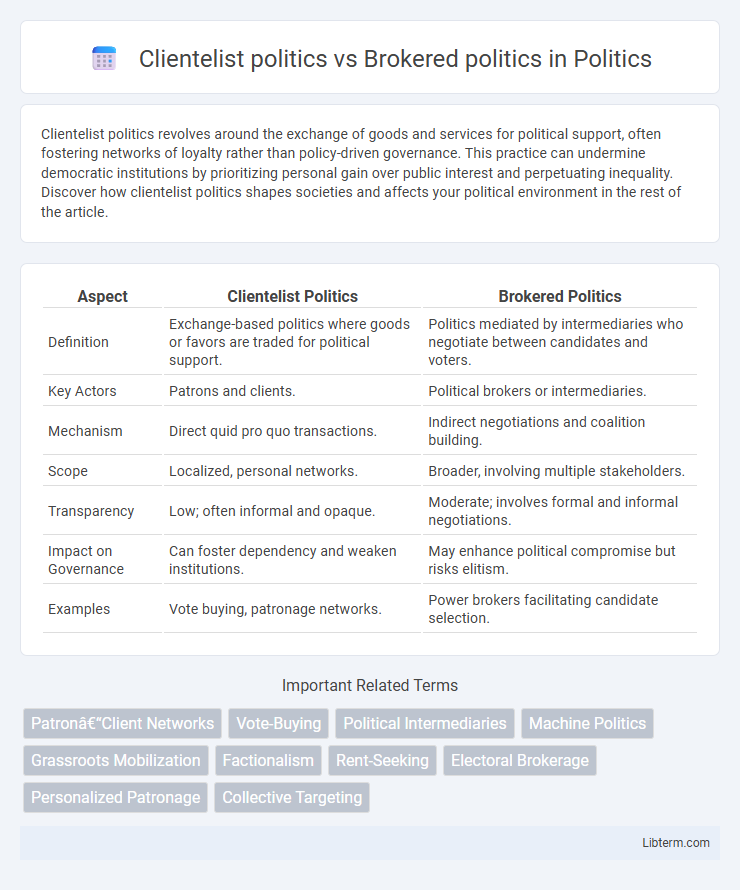Clientelist politics revolves around the exchange of goods and services for political support, often fostering networks of loyalty rather than policy-driven governance. This practice can undermine democratic institutions by prioritizing personal gain over public interest and perpetuating inequality. Discover how clientelist politics shapes societies and affects your political environment in the rest of the article.
Table of Comparison
| Aspect | Clientelist Politics | Brokered Politics |
|---|---|---|
| Definition | Exchange-based politics where goods or favors are traded for political support. | Politics mediated by intermediaries who negotiate between candidates and voters. |
| Key Actors | Patrons and clients. | Political brokers or intermediaries. |
| Mechanism | Direct quid pro quo transactions. | Indirect negotiations and coalition building. |
| Scope | Localized, personal networks. | Broader, involving multiple stakeholders. |
| Transparency | Low; often informal and opaque. | Moderate; involves formal and informal negotiations. |
| Impact on Governance | Can foster dependency and weaken institutions. | May enhance political compromise but risks elitism. |
| Examples | Vote buying, patronage networks. | Power brokers facilitating candidate selection. |
Defining Clientelist Politics
Clientelist politics involves the exchange of goods, services, or benefits directly between politicians and voters to secure political support, often operating through personalized, informal networks. It relies on patronage and favors, creating a system where political loyalty is contingent on material rewards rather than ideological alignment or policy platforms. This form of politics contrasts with brokered politics, where intermediaries negotiate broader alliances and interests across diverse groups to achieve political goals.
Understanding Brokered Politics
Brokered politics involves intermediaries, or brokers, who mediate access to resources and political favors between constituents and politicians, facilitating negotiated exchanges rather than direct loyalty. Unlike clientelist politics, which relies on direct, personal relationships between politicians and voters, brokered politics creates layered networks that distribute benefits through agents, enhancing political stability and competition. This system allows for more complex coalition-building and strategic resource allocation within political campaigns and governance.
Historical Origins of Clientelism
Clientelist politics trace their historical origins to pre-modern societies where personal relationships and exchanges of goods or favors fostered loyalty between patrons and clients, forming the basis of hierarchical social structures. This system evolved from traditional kinship and feudal networks, emphasizing direct, reciprocal bonds rather than ideological or institutional affiliations. Brokered politics, contrastingly, emerged as intermediaries mediating between political candidates and diverse interest groups, often facilitating broader coalitions beyond the immediate patron-client dynamics.
Key Features of Brokered Politics
Brokered politics involves negotiation and coalition-building among multiple parties or factions to form a governing majority, often marked by power-sharing agreements and policy compromises. Key features include the mediation role of brokers who facilitate deals, the fragmentation of political power, and the emphasis on strategic alliances rather than direct patron-client relationships. This system contrasts with clientelist politics, which relies heavily on personal loyalty and resource exchange between patrons and clients.
Mechanisms of Patronage and Influence
Clientelist politics operates through direct exchange mechanisms where patrons provide targeted benefits like jobs or services to clients in return for political support, creating personalized loyalty networks. Brokered politics involves intermediaries or brokers who mobilize votes by negotiating access to resources and favors between politicians and constituents, often mediating multiple patron-client ties simultaneously. Both systems rely on patronage as a tool for influence, but clientelist networks emphasize individual, dyadic relationships, whereas brokered politics depends on organized mediation and broader coalition-building strategies.
Voter Behavior in Clientelist Systems
Voter behavior in clientelist systems is characterized by personalized exchanges where votes are traded for material benefits such as money, goods, or services. This dynamic fosters dependency and limits collective political engagement, as voters prioritize immediate, tangible rewards over policy or ideological considerations. Clientelist politics often undermine democratic accountability by reinforcing patron-client networks that influence electoral outcomes through direct, transactional interactions.
The Role of Political Brokers
Political brokers play a crucial role in both clientelist and brokered politics by mediating relationships between voters and political elites to secure electoral support. In clientelist politics, brokers facilitate the direct exchange of goods, services, or favors for votes, often mobilizing local networks to maintain patronage systems. In brokered politics, brokers negotiate alliances between competing factions or parties, shaping coalition formations and influencing candidate selections within political organizations.
Consequences for Democratic Accountability
Clientelist politics erodes democratic accountability by fostering patronage networks that prioritize personal loyalty over public interest, leading to corruption and weakened institutions. Brokered politics, while also involving intermediaries, tends to institutionalize negotiations and power-sharing, which can stabilize governance but dilute direct voter influence and transparency. Both systems complicate clear accountability, but clientelist practices more overtly undermine mechanisms for holding leaders responsible to constituents.
Case Studies: Global Examples
Clientelist politics relies on direct exchanges of goods or services for political support, often seen in Latin America where politicians distribute resources to maintain voter loyalty. Brokered politics involves intermediaries who negotiate between political actors and constituencies, exemplified by India's regional party coalitions that broker power by aggregating diverse interests. Case studies from Nigeria illustrate how clientelist networks control patronage systems, while brokered politics in Belgium's consociational model demonstrates power-sharing arrangements through negotiated compromises.
Reform Strategies and Future Trends
Clientelist politics often rely on personalized exchanges and patronage networks, making reform strategies focused on increasing transparency, strengthening institutions, and promoting civic education essential to reduce dependency on clientelism. Brokered politics involve intermediaries who negotiate between political actors and constituents, requiring reforms that enhance accountability, streamline communication channels, and encourage direct representation to diminish brokers' influence. Future trends suggest a shift towards digital platforms and data-driven engagement, offering opportunities to disrupt traditional clientelist and broker-mediated systems through improved voter mobilization and policy monitoring tools.
Clientelist politics Infographic

 libterm.com
libterm.com